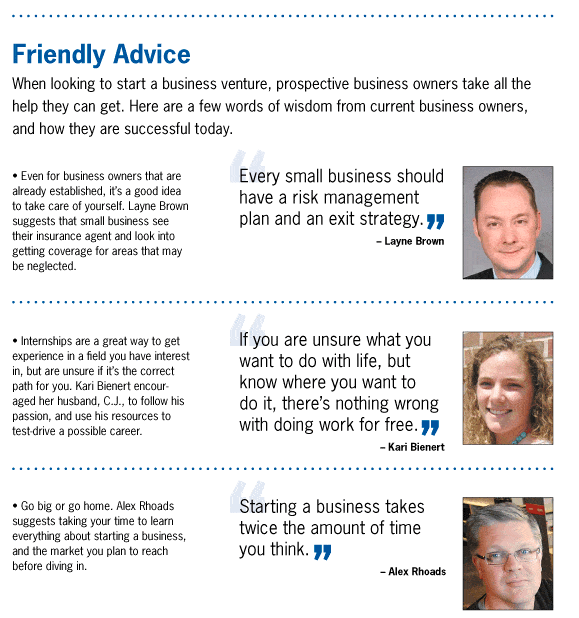Open for business
Local entrepreneurs boost economy by turning their passion into a niche market.

It’s hard to imagine Alex Rhoads as a divorce attorney. Such a somber job just doesn’t seem to jibe with the jovial gentleman who greets you at AllSpice with his quick wit and an honest understanding of his customers’ needs.
“During the recession, people cook at home more, and our shop is a way of feeding that hobby — no pun intended,” Rhoads said.
Sure, he’s laughing now, but this work environment is quite a change from a year ago. Rhoads would wake up every day with a zeal for life, but his smile vanished when he set foot in his office. As a divorce lawyer, Rhoads had many unhappy clients and made no personal connections. After 15 years, Rhoads wanted a change. He needed to be surrounded by optimism. He wanted a little spice in his life.
So, Rhoads and his wife, Jennifer, started AllSpice, a shop in Des Moines’ East Village, which sells — you guessed it — spices. The spice products and blends come from across the country and all over the world. Rhoads receives mustard seed from Canada, sumac from Turkey and cubeb berries — a tiny black pepper alternative — from Africa.
The couple opened AllSpice in September 2010. At that time, the U.S. unemployment rate was nearing 9.6 percent, and new business development was just beginning to pick up. 2010 marked the first year since 2006 that the number of new sales tax permits issued to new businesses in Polk County increased from the previous year, according to the Iowa Department of Revenue. 1,647 New salex tax permits were issued in 2010, down from the 1,830 issued in 2006, but up slightly from a 2009 low of 1,576.
Along with other new business owners, Rhoads wasn’t deterred by the economy from launching his shop. Instead, it spurred him on.
“It’s actually a great time a start a business,” Rhoads said. “Rent is low, and our products are a low-cost luxury in the recession.”
Families are cutting back on dining out, allowing AllSpice to develop a unique client base. “Customers are more willing to spend $20 to $30 in our store than in a restaurant,” Rhoads said.
From a numbers standpoint, now is as good a time as any to start a small business in Iowa as business advantages continue to present themselves. Des Moines was ranked No. 1 in Forbes magazine’s Best Places for Business and Careers in 2010. Forbes claims that the quality of life in Iowa’s capital city and slight decrease in its unemployment rate contribute to the high ranking. In terms of saving money, Iowa also tops the charts. The Iowa Department of Economic Development reported gas and electric costs to be the lowest in the nation in 2009. Both large corporations and small start-up businesses can benefit from these low operating costs.
Homework matters
C.J. and Kari Bienert worked in the cheese and wine industry, respectively, for more than six years. They were looking for a way to move forward in their careers. But their main goal is to get Iowans to “eat more cheese.”
Together they created The Cheese Shop of Des Moines, which is scheduled to opennear Ingersoll Avenue and 42nd Street in the fall of 2011. The shop began as a way to combine their passions and provide an opportunity for the Bienerts to work for themselves. The husband and wife took their passion for cheese and developed a plan to educate the community, bridging the gap between local farmers and customers. “We want to be open about everything,” Kari said. They plan to hold classes, events and tastings to help customers learn about the cheese creation process from the farmhouse to the kitchen table. Before their business began taking shape, C.J. and Kari spent a year researching to ensure they had what it takes to succeed.
Last year, C.J. completed a three-month internship in Vermont at the Cellars at Jasper Hill, where he learned the craft of artisan cheese manufacturing. It was this venture that propelled the Bienerts’ desire to start their own business. Following this decision, C.J. and Kari spent eight months traveling the United States. They tasted cheeses in numerous small-town shops and learned from the mistakes of experienced entrepreneurs. They certainly did their homework, yet they continued to learn more about business planning when they returned to Des Moines.
C.J. and Kari received the most help from Des Moines’ Small Business Development Center (SBDC). “I would recommend it to anyone starting a business,” Kari said. The SBDC helps prospective and current business owners put together a business plan and research the market, and provides timely guidance along the way.
Jan Bruene, SBDC program coordinator, said the economics of the economy is not the deciding factor of whether a business will prosper. “Economy isn’t the entire picture. It’s a piece of the picture,” she said. “If a person does the due diligence of planning, they will know ahead of time whether the business will succeed.”
Bruene said having a niche for your business is crucial. “[Small businesses] need to have a specific market,” she said. “You will know what folks want and what they need.”
As an organization, the SBDC is able to do just that — give its clients the information they need to succeed. In 2010, its Mid Iowa office counseled 249 clients in 1,184 hours. That office is one of 15 in the state, and just one organization helping people start and maintain small businesses. Recently the number of prospective business owners seeking advice from SBDC and similar groups has been steadily climbing.
Do what’s right for you
Dave Lentell, public information officer at the U.S. Small Business Administration office in Des Moines, says he finds it interesting that the number of small busineses has risen during the economic downturn. “We’ve seen an uptick in the number of people starting small businesses,” he said. The surge in numbers could have various reasons, such as the individual fear of being downsized or having a pay cut.
“Alternately, someone who has been downsized and is having trouble finding employment often looks at starting their own business,” Lentell said. ”They want to take control of their own economic destiny.” For some, this independence is a curse; for others, it can be a blessing in disguise.
After graduating from Iowa State University, Layne Brown landed a job with benefits at a big corporation and thought he was set for years. Right at the time he was hired, his company merged with another, resulting in cutbacks for both. After one year with the corporation, employee cutbacks continued to be made and Brown was let go. “I had a chip on my shoulder, and I took it personally,” he said.
Brown did not want to be in that situation again, so when a family friend suggested he look into becoming an insurance agent, Brown decided to give it a chance. “The more I learned about the business, the more I realized this was working for yourself,” he said. “If I was fired, it would be because I didn’t do the job, not because someone pulled the plug.”
The transition to becoming an agent was financially stressful, Brown admits. “I needed to pass a series of six different insurance and investment licensing tests,” he recalled. “This took me about one and a half months studying 50-plus hours per week.” During this time, Brown was able to get by financially due to a small amount of savings and collection of unemployment benefits.
When Brown later decided to start his own business, he was able to do so without much financial assistance. “I was able to personally finance this business venture, because insurance and financial services doesn’t require a lot of overhead expenses,” he said, adding that the process does require some outside help. “The company that I started with also offered a new agent financing program.”
Brown now owns an insurance firm, C.L. Brown and Associates, in Pleasant Hill with his wife, Cher. “It was really a blessing in disguise that motivated me,” Brown said. Being let go from his first job led to his desire to help people and learn from the mistakes of others. Brown believes passion is a key factor in operating a successful small business. “If you don’t have passion, you shouldn’t do it,” he said. “It’s too hard.”
Not all business ventures are practical. Lentell warns that success depends on the type of business you are looking at starting. “If you are able to find a niche or something customers can’t easily cut out of their budget, you have a better chance to be successful,” Lentell said. “We encourage people to really evaluate what they’re going to do, the financial climate and the economic situation.”
Passion yields success
There is no equation for guaranteed success, but finding a specialty or unique niche in your chosen field will propel your business. SBDC program coordinator Jan Bruene said, “Having a niche gives you a relationship in your field.” This niche and a helpful smile will keep them coming back for more, allowing you to increase profits and make connections with new friends.
Alex Rhoads is excited to be making personal connections with his customers. When customers come in to buy spices, Rhoads shares his personal recommendations and engages in friendly conversations about the endless possibilities each spice provides.
Finally settled into a fulfilling career, Rhoads is happy he took the plunge to start AllSpice. “At first we weren’t sure if the population of Des Moines could support us,” he said. After he saw other businesses popping up throughout the metro area, Rhoads knew he had to go for it.
It was a big leap, but at the end of the day, the stress Rhoads feels is different from the stress he felt in his previous job.
“If you are truly interested in your business, it brings really positive, happy stress,” he said.
“When making a decision to be in business for yourself, you need confidence in numbers and ideas, and the intestinal fortitude to just do it.”

Marina Shawd is a journalism student at Drake University. She can be reached at marina.shawd@gmail.com.











